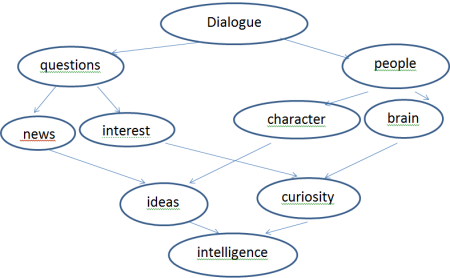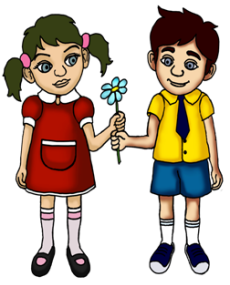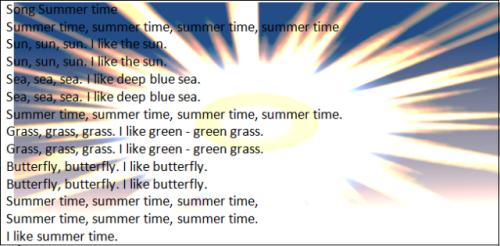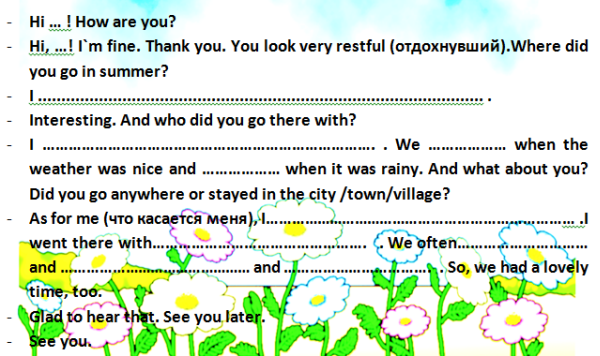Развитие навыков и умений диалогической речи по теме «Каникулы»

Цели:
Образовательная: обеспечение в ходе урока развития навыков и умений диалогической речи, повторение образования и употребления разнообразных типов вопросов.
Развивающая: развитие таких аналитических способностей, как умение анализировать, сравнивать, обобщать, развитие памяти, воображения, логического мышления и смысловой догадки, коммуникативных навыков.
Воспитательная: воспитывать потребность у учащихся в использовании иностранного языка как способ получения новой информации, воспитывать культуру взаимоотношений при работе в парах, группах; воспитывать интерес к изучаемому языку.
Литература:
Для учителя:
1. Ваулина Ю. Е., Дули Д., Подоляко О.Е. «Английский язык 5 класс».
2. М.З.Биболетова. Книга для учителя для 5 класса Английский с удовольствием (Enjoy English). Титул, 2010.
Для учеников:
1.Ваулина Ю. Е., Дули Д., Подоляко О.Е. «Английский язык 5 класс».
2.Биболетова М.З. Трубанева Н.Н. Рабочая тетрадь к учебнику «Enjoy English 5−6».
Тип урока: урок общеметодологической направленности (развитие навыков и умений диалогической речи).
План урока:
1. Организационный этап.
2. Введение в атмосферу иноязычного общения.
3. Постановка цели урока. Мотивация учебной деятельности.
4. Проверка домашнего задания.
5. Повторение пройденного материала.
6. Закрепление пройденного материала.
7. Подготовка учащихся к построению собственных диалогических высказываний.
8. Физкультминутка.
9. Организация диалогической речи.
10. Контроль и коррекция ошибок учащихся.
11. Рефлексия.
12. Заключительный этап.
Ход урока:
1. Организационный этап.
Good morning, students. How are you doing today? Are there any questions you would like to ask me? Have you got any news you`d like to share with the class?
2. Введение в атмосферу иноязычного общения.
We`ve just had a small conversation. Tell me please, what is it built of?
Right you are. All our dialogues are made up of questions and answers. Look at the blackboard. There you see the word dialogue. Let`s find out what it means for you.

3. Постановка цели урока. Мотивация учебной деятельности.
So, today we`ll become more intelligent/clever. We`ll continue working with our topic and as you`ve understood we`ll learn how to build dialogues because it is the main form of people`s communication.
4. Проверка домашнего задания.
While your classmates are telling me their plans for the next summer, I want you to listen attentively and write down one question to each story. Any question you like.
5. Повторение пройденного материала.
Thank you for the stories very much. Well done! Now, please, ask your questions. (зачитывают вопросы пока без коррекции ошибок). And answer the questions.
I can tell you that there were a few mistakes in your questions. Let`s revise tree types of questions that we know and then correct the mistakes because to build a dialogue we can`t do without questions.
Before let`s translate the following words: auxiliary verb (вспомогательный глагол), subject (подлежащее), main verb (основной глагол), word order (порядок слов).
Текст видеофрагмента.
Let`s revise how we build questions. Now you know three types of questions: General questions or so called — yes/no questions. For example: Do you like summer holidays?
Special or Wh questions — questions which start with the words What, where, when, why, whose and some other. For example: What did you do last summer?
And Alternative or so called or- questions. For example: Do you like fishing or swimming?
Let`s revise word order in these types of questions.
General questions. They are called yes/no questions because we can answer yes or no to this type of questions. They start with an auxiliary verb (do/does, did, will) — depending on the tense of the main verb, then the subject of the sentence (подлежащее) and only then the main verb in the 1st form. Only after that we write other words - other parts of the sentence.
Look: Do you like swimming? - вспомогательный глагол (auxiliary verb) стоит перед подлежащим, затем следует основной глагол в начальной форме и только затем остальные члены предложения. And we answer — Yes, I do. Использовали вспомогательный глагол do, так как это настоящее простое время.
Did you swim last summer? Ты плавал прошлым летом? — and again the same word order. _ and we answer — No, I didn`t. используем вспомогательный глагол прошедшего простого времени.
One more example: Will you go to the sea-side? Yes, I will. Здесь мы использовали вспомогательный глагол Будущего простого времени.
Special questions or Wh — questions. They usually start with the words: What — что, какой? When — когда, Why — почему, Where — где, куда? Или whose — чей? You see that all these words start with WH.
Word order — порядок слов: a wh — word, an auxiliary verb of the tense, subject, main verb in its 1st form and other words.
Look: Where will you go next summer? — Куда ты поедешь следующим летом? На этот вопрос мы не можем ответить да или нет. Нам нужно дать ту информацию, которую запрашивает вопросительное слово — wh — word.
And finally, alternative questions. Они и называются альтернативными, потому что в вопросе будет выбор, альтернатива. И помогает нам в этом союз или на английском or. Look: Do you like summer or winter holidays? Ты любишь летние или зимние каникулы?
Word order is the same as in general questions: auxiliary verb of the tense, subject, main verb in the 1st form and other words. But here we add an alternative, но здесь мы добавляем выбор. И этот выбор можно поставить к любому подходящему по смыслу слову.
Окончание видеофрагмента
6. Закрепление пройденного материала.
Now, let`s train a bit our grammar.
Task 1.
Each pair gets the paper with two sentences. I want you to ask each other as many questions as it would be possible to find out more information. And of course, you have to answer them, using your sentences.
1) I like summer holidays because I don`t have to go to school.
2) I like winter holidays because we go to the mountains (горы) and ski (кататься на лыжах) there.
3) I like spring holidays because it`s warm and we can play football outside.
4) I like going to the country in summer because I visit my granny and meet my friends there.
5) I enjoy going to a camp in summer because we play lots of games and meet new friends there.
6) I would like to stay in the city in summer because I like going to the swimming pool every day and at the weekend my parents take me to the disco.
7) I miss school in summer because I don`t see my friends.
8) In summer I would like to go to an English summer school to improve (улучшить) my English.
9) I want to travel next summer because I like discovering (открывать) new places and learning about different countries.
10) I like New Year holidays most of all because it`s magic time and we all get lots of presents.
Now let`s check your questions and answers. But I need helpers to listen to you. (выбираем помощников для обнаружения ошибок в вопросах, либо ответах, объясняя, что это не для вреда и обиды, а для помощи одноклассникам).
7. Подготовка учащихся к построению собственных диалогических высказываний.
Task 2. Now please, let`s read and translate the dialogues given on the papers (диалог представлен ниже).But there are 5 mistakes in it. You have to be very attentive to find them.
Now please, name all the questions and their types.

— Hi, Ann. How are you doing?
— Hallo, Tom. I`m fine, thank you. And what about you?
— I`m fine, too. Thanks. You look swarthy (загарелый). Do you go to the sea-side last summer?
— Yes, I did. I go to the Black Sea.
— When did you go there?
— I went there in July.
— Does you go there with your parents or friends?
— I went there with my mom. And what about you, Tom. Where did you spent your summer?
— I am in the country. I was there with my Granny and my brother Mike. We had a lovely time. We went swimming, fishing and riding our bicycles. I think I go there again next summer.
— It`s good we both (оба) enjoyed our summer time.
— Oh yes, it is.
The keys: 1) did you go to the sea-side last summer. 2) I went to the Black Sea.
3) Did you go there with your parents or friends?4) I was in the country.5) I think I will go there next summer.
8. Физкультминутка.
Now let`s relax and sing the song about summer. Do you remember it? (sing, show the sun, sea, grass, butterfly).

Wonderful! Nice to see you smiling and singing.
9. Организация диалогической речи.
Now I give you the papers with the dialogues where some phrases are missed. Your task is to finish the dialogue. (about yourselves)
Dialogue.

10. Контроль и коррекция ошибок учащихся.
Проводится в ходе проверки диалогов учащихся.
11.Рефлексия.
Thank you for your great work today.
Now please, depending on your mood, and result of the lesson whether you reached the aim of the lesson stick on the blackboard 1−5 flowers.
12. Заключительный этап.
Выставление отметок и объяснение домашнего задания:
Your homework is to learn the dialogues by hea
Получите комплекты видеоуроков + онлайн версии
Похожие записи
 44574
44574 Нравится
0
Нравится
0

 Получите свидетельство
Получите свидетельство Вход
Вход










Татьяна Петровна Исупова. Хабаровск, МБОУ СОШ 330